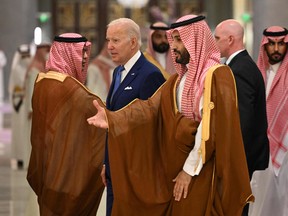Avi Benlolo: Biden's potential Saudi-Israel peace deal is really about China
An agreement with Saudi Arabia would allow Washington to keep Riyadh from falling into Beijing's hands

Article content
It’s now obvious that America’s negotiations with Saudi Arabia have nothing to do with Israel and the Palestinians, and everything to do with U.S. national security. The White House is rightfully concerned about China’s encroachment in the region, which includes a plan to build a military base in the United Arab Emirates, and is looking to shore up a longstanding ally that is increasingly making inroads with Beijing.
The Saudis, for their part, are smartly leveraging the United States to further their own national interests, demanding security guarantees and assistance developing a nuclear power program.
The Biden administration distanced itself from Saudi Arabia following the Jamal Khashoggi assassination. Since then, the Saudis have raised eyebrows in Washington by cozying up to China.
Last weekend, the Saudis hosted high-level Ukraine peace talks that included a delegation from China. Although U.S. representatives attended the talks, China was seen as the main power broker. According to one news report, “Merely having a Beijing delegation at the summit was a major cause for optimism.”
To make matters even worse for America’s longstanding hegemony in the region, the Saudis and the Iranians recently normalized relations after severing diplomatic ties seven years ago. This, too, was a snub at the Biden administration, which has been unable to resurrect the Iranian nuclear deal.
A deal with Saudi Arabia would allow Washington to ensure Riyadh continues to be an ally in the region, but in order for that to happen the Saudis need to be seen to be advancing the Palestinian cause, at least on paper. The Palestinians have always been used by the Saudis as a Trojan horse to leverage military hardware and other support from the U.S., and this is no exception.
But interest in the Palestinians is waning on all sides. The Palestinian leadership’s corruption have seen them lose support among many Arab leaders. By now, the Palestinians would have had their own state, had they accepted the countless peace deals presented to them since the Oslo Accords.
Nevertheless, America needs Israel’s acquiescence on the Palestinian issue. This may include a freeze on settlement expansion and the construction of an airport, to free up movement on the Palestinian side.
Given the state of affairs in the Palestinian Authority, including disunity between Gaza and Ramallah, and increasing terrorist activity in places like Jenin, none of the parties to this potential agreement — Israel, Saudi Arabia or the U.S. — have all that much interest in seeing the formation of a Palestinian state at the present time. It’s obvious that the Palestinian Authority has lost the confidence of its own population and, more significantly, of the international community.
Israel, on the other hand, despite its political differences, has become a regional superpower. Its recent peace agreements with the United Arab Emirates, Morocco and Bahrain have been a boon to the regional economy. Innovation and trade is blossoming, as the flow of goods and services between these countries continues to increase.
The Saudis, looking ahead into their future, want a piece of the action, and have made their own moves to improve relations with the Jewish state. Last year, for example, Saudi Arabia granted Israel permission to fly over its airspace. The Saudis have also softened their negative, and sometimes antisemitic, rhetoric about Israel.
Israel wants to normalize ties with the Saudis, as well, but probably not at any price. Even with American pressure, the current government is unlikely to compromise on the Palestinian question. In the last six months, terrorist attacks against Israelis have skyrocketed. This has hardened Israel’s position vis-a-vis any rapprochement with the Palestinian Authority.
Sure, the Biden administration would like a diplomatic win in the Middle East. But more importantly, its threatened by China and Russia’s growing dominance in the region.
The Saudis, noticing America’s growing weakness and criticism of its human rights record, have moved away from their long-time partner and friend. But it’s not too late. A renewed deal could be struck with the Saudis and, as a bonus, a peace agreement with Israel would increase regional stability.
In a fractured world, where despot regimes are gaining strength, the time for peace and global stability is now.
National Post
Avi Benlolo is the founder and chairman of the Abraham Global Peace Initiative.













Postmedia is committed to maintaining a lively but civil forum for discussion. Please keep comments relevant and respectful. Comments may take up to an hour to appear on the site. You will receive an email if there is a reply to your comment, an update to a thread you follow or if a user you follow comments. Visit our Community Guidelines for more information.